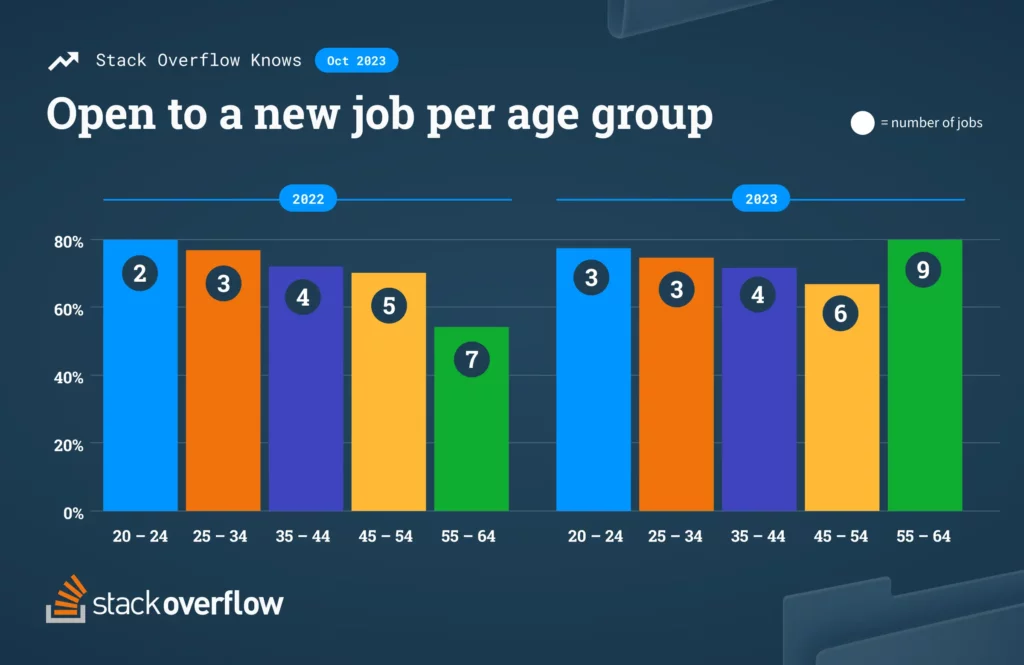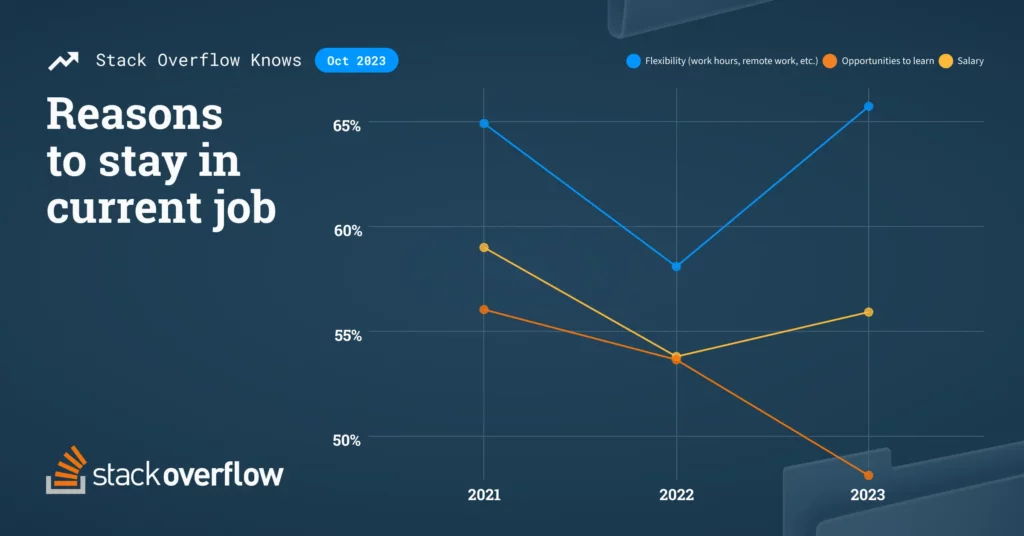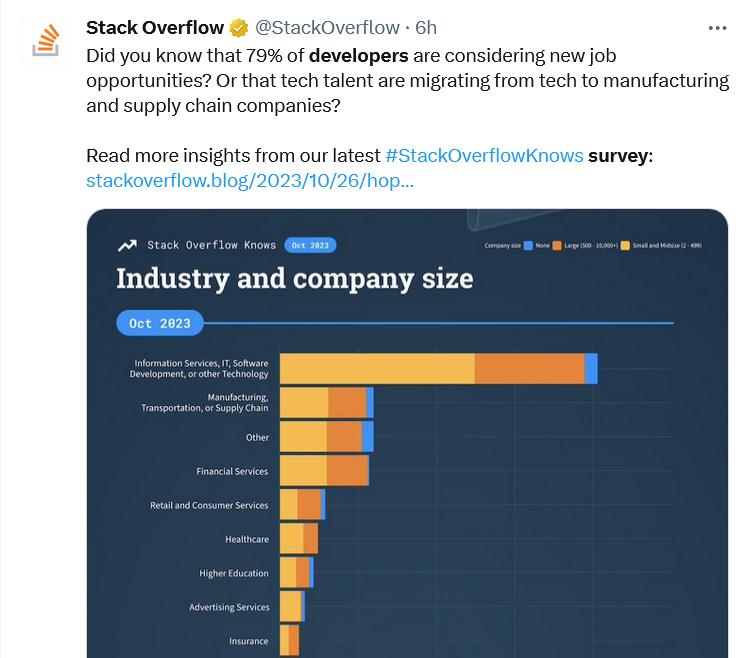Curiosity kills cats, spurs developers to job hop

• The new Stack Overflow Developer Survey shows developers have itchy feet.
• While everyone wants more money to counter inflation, flexibility is the key driver of job hunts.
• The tightened job market is a key factor in developers’ curiosity.
Results from the latest Stack Overflow Developer Survey show that developers are looking for – or at least open to – new jobs. Moreso than any time within the last two years.
The survey received over 1,000 developer responses, and 79% of those surveyed are considering new job opportunities – if not actively looking for their next move. In terms of career level, both new tech talent and late-career developers are more likely to be looking than they were previously.
New developers getting increased experience.
New developers have increasingly switched jobs compared to early- and mid- career developers in the last three years.
Alongside the results, Stack Overflow published some reasoning for the way the Developer Survey was answered. A lower number of entry-level openings and a lack of perceived stability due to layoffs in the tech industry could explain the job hopping.
There’s migration out of the tech industry and skilled developers are exploring career changes out of curiosity, too.
Developers from 107 different countries responded to Stack’s October pulse survey. Most developers still work predominantly in the technology industry (46%), followed by manufacturing and supply chain (14%), and financial services (13%).
Developers reported working at a small or midsize company of less than 500 (56%) more often than a larger company of 500-10,000+ (38%).
In the pulse survey carried out in October, compared to the 2023 Stack Overflow Developer Survey, 8% of developers have left the technology industry and taken roles in manufacturing and supply chain companies.
The US and Germany showed the highest concentrations of manufacturing and supply chain developers, while India had the highest concentration of technology developers – perhaps unsurprising, given both the nation’s relatively low wage threshold and its national aspirations to grow as a technological center of its region.
Not only does India have a concentration of developers in the tech industry, it’s also positioned to take on more tech opportunities. The latest survey analysis showed how new tech talent and India’s tech sector revenue had been growing.
Developers were also shown to be onboarding more in 2023. Regarding age groups, interest in looking for a new job drops as 44 is approached for new- to mid- career respondents, but picks back up for those aged 55-64.
All age groups ranked a better salary as the top reason they’d look for a new job this year. It’s hard to imagine that this answer changes much across industries…
Late-career developers listed “curiosity” as the second-most likely reason they’d change jobs.

Who’s most open to a new job? Via Stack Overflow.
Curiosity is what’s driving developers to look at different jobs before beginning an official search. Survey responses indicate that the top two ways developers find out about companies they might want to work for are job boards (53%) and their network (39%).
The experience of late career developers combined with newly increased curiosity might be the reason for the jump in interest in new jobs. It’s also likely the cause of the median number of jobs held by respondents rising from seven to nine.
Second to late-career developers among age groups most likely to be open to a new job was new tech talent, who further reported they have held the same number of jobs in 2023 as early-career developers who are also searching for jobs.
All onboard!
New tech talent is onboarding as many jobs by the age of 24 as those up to ten years older – this rapid experience cycle could rival the knowledge and experience of those to whom they report.
Sentiment data from the Slack Overflow Developer Survey hints that knowledge-sharing will be a barrier as new tech talent moves into roles with more experience: 63% of new tech talent agrees or strongly agrees they are able to quickly find answers to their questions, compared to 56% for more mature developers. Bad news for the older dudes? Or will AI tech arrive in the nick of time to save Gen X?
Age aside, developers cite salary and flexibility, in that order, as the top reasons they’d leave current positions. Income and spending pressure could be reasons for changing jobs more regularly in recent years, as another survey suggests that salaries aren’t able to adequately keep up with inflation.

Should you stay or should you go? Via Stack Overflow.
This year, fewer developers reported learning opportunities as an important factor for staying at their jobs than in the last two years.
In 2021, 54% of developers said they stay in their current roles because of the learning opportunities, which decreased to 51% in 2022 and 44% this year.
In all three years that the survey has run, flexibility has been a top reason to stay at a role.
A summary of a recent Gallup poll from The Economist posits that low levels of engagement at the workplace (not just for developers but all workers) is measurable, and explains why workers are generally more interested in doing only what is necessary and not taking on opportunities to learn.

The Stack Overflow Developer Survey showed developers’ favorite sectors.
The 2023 Stack Overflow Developer Survey and the pulse survey both included questions about AI and sentiment around it in the developer community: 70% use AI or are planning to. Developers may also feel less enthusiastic about learning opportunities now that AI tools are rapidly developing to help many be more productive in their jobs (this was cited as the top benefit of AI by 30% of respondents).
Ultimately, flexibility beats all else for developers. A tighter job market might keep comfortable developers where they are, while those who lack flexibility will look for flexibility elsewhere. As posited by Glassdoor, the migration of tech developers to other industries might be a reaction to the corporate culture of tech companies reducing flexibility in order to justify higher pay.
There’s logic there, but it’s flawed. Respondents of the survey all want higher pay – but not at the cost of their flexibility.










